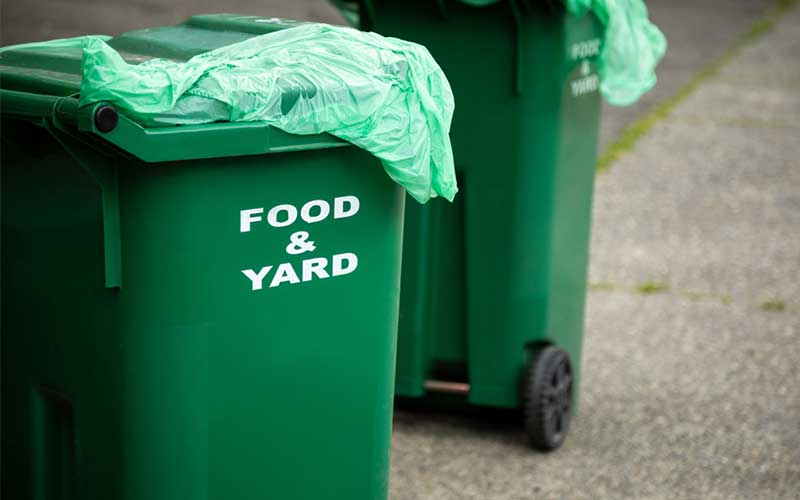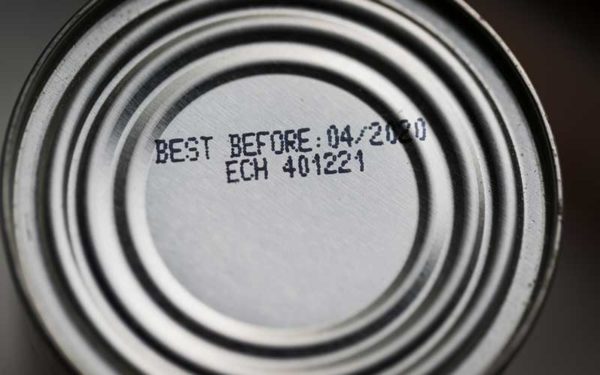
Food scraps and yard clippings are anything but trash. Photo Credit: Shutterstock
While considered organic waste, food scraps and yard clippings are anything but trash. When properly recycled, they become rich, nutritious compost that can fertilize and replenish soil.
For decades, the idea of recycling organic waste (otherwise known as composting) was radical – unless you lived on a farm. But recent years have seen a shift in our understanding of these materials and why it’s so important to keep them out of landfills. Now, we have composting programs all across the country. Some consist of donation-style bins where you can drop off your organics, while others offer a curbside pick-up subscription.
As food and yard waste are big contributors to our waste stream, the uptick in composting is a huge step forward in combatting our trash crisis. But you and I can’t do the hard work on our own. We need cities, towns, and even states to invest in infrastructure that will make it easy and affordable for everyone to compost.
Why Composting?
For far too long, we have mishandled food waste – throwing it out to be buried or burned with our household trash. In fact, food scraps and yard waste, combined, make up more than 30% of our nation’s waste stream. If that weren’t bad enough, landfilling these resources has dire consequences for the environment and our climate.
You see, landfills are the third-largest source of climate-damaging methane emissions in the United States. Here’s why: In a landfill, organic waste gets buried under mounds of toxic trash, so it can’t break down like it would in a compost pile. Instead, it rots and emits methane. In the end, all of that organic waste – which should benefit our environment – now threatens it.
But it doesn’t have to be that way. The mishandling of organic waste is a problem that we can easily solve. By keeping organic waste out of landfills, and instead investing in composting programs, we can give these resources new life.
Residential Composting Is Sprouting Across the Country
The past several years have seen a surge in residential composting services in the U.S. In fact, they grew by 87% between 2014 and 2017 alone. And the demand for these services isn’t slowing down anytime soon.
Today, the U.S. is buzzing with industrial compost businesses – many of which offer residents weekly or bi-weekly curbside collection subscriptions. While these services keep large amounts of food and yard waste out of landfills, their success often relies on people like you and me coming around to the idea of composting on our own.
But cities and towns across the country are changing that. Take San Francisco. In 1996, city leaders established the nation’s first large-scale food composting program, and with overwhelming success. In fact, by 2000 50% of the city’s food waste was being composted. Needless to say, San Fran knew it could up its game – and it did.
By 2009, the city had implemented a mandatory recycling and composting policy, requiring everyone – from residents to businesses to tourists – to separate their trash into recycling, landfill, and compost bins. The policy pushed San Francisco’s goal to keep 75% of food waste from being landfilled over the edge, reaching 78% in 2011.
New England Cities and Towns Embrace Curbside Organic Recycling
Other cities and towns across the country have since followed in San Francisco’s footsteps, like Portland, Oregon, and Seattle, Washington. But large urban areas aren’t the only ones hopping on the composting train. Smaller cities and towns are also doing their part to keep organic materials out of the landfill. A few here in New England include:
- Cambridge, Massachusetts – one of the state’s first cities to implement a government-run service. While the program is flawed, its participation is a success – with 25,000 households (about half the city) involved, as of 2018.
- Brookline, Massachusetts – recently entered a partnership with Black Earth Compost. As of November 2020, more than 1,000 residents were enrolled in the program – up from 500 in July.
- Kennebunk, Maine – offers privately billed curbside subscription services to residents through a partnership with “We Compost It!”
- Chittenden County, Vermont – provides residents with several licensed haulers that collect food scraps throughout the county, including Burlington, the state’s largest city.
Organic Waste Bans Jumpstart Composting Efforts – But Is It Enough?
While there are no statewide, government-run composting programs anywhere in the country, many states are taking action through organic waste bans – prohibiting food scraps and yard clippings from being thrown out with the trash. These bans primarily target businesses generating large amounts of food waste, as in Connecticut, Massachusetts, and Rhode Island. Vermont is the only state in the region – and nation – to have a statewide Universal Recycling Law targeting both businesses and residents, and that bans food waste, yard clippings, and recyclables from the trash.
While these statewide bans are a step in the right direction, they don’t provide everyone with the means to compost. Curbside services are only available in certain cities and towns (and don’t typically include multi-unit buildings), drop-off programs aren’t always cheap or easily accessible, and not everyone has the means to compost at home.
So, what’s the solution? Well, Hamilton, Massachusetts, has a model for what could be the future of residential composting: pairing an organic waste ban with a government-run composting service.
The Town provides every household with a green compost bin and requires residents to put the bin out for collection on the same day as trash pick-up. The waste hauler then collects both trash and organic waste – separating the materials in a truck with two compartments. The trash goes to a landfill or incinerator and the organic waste gets taken to Brick Ends Farm.
This innovative pairing of an organics ban with a composting service sets the tone for how to strengthen wide-scale composting infrastructure in New England and even nationwide.
Nowhere to Go but Up
Curbside composting works and can give our organic waste new life. But as independent curbside services continue to rise, we must remember that our organic waste problem is not up to individuals to solve alone. Cities and towns must play a role – by partnering with industrial composters and building infrastructure that makes composting affordable and accessible for all residents.
By now, I’m sure you’re itching to compost. First, check with your city or town to see if they offer local organic collection opportunities. If not, call on your city or town officials to adopt composting infrastructure!
Don’t feel like waiting for your local officials to invest in curbside composting? Check out this list to see how you can compost in your state.
And keep an eye on your inbox. We’ll let you know when you can take action to push for food waste bans and better composting options near you.



